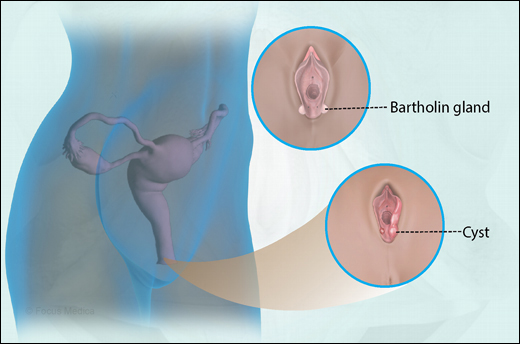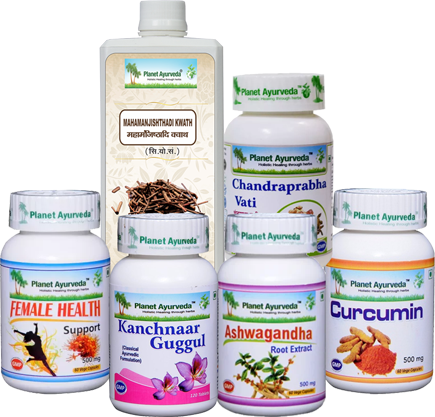Ayurvedic Treatment For Bartholin Gland Cancer With Herbal Remedies
Abstract
Cancer is a disorder in which the body’s cells grow out of control and spread to different bodily areas. In the body, it can begin anywhere and grow into trillions of cells. Typically, human cells divide and develop, giving rise to new cells that are crucial for the body’s continued growth. Also, in the regular process, damaged cells die and are replaced by new ones. Sometimes, this balance is upset, and the cells begin to proliferate abnormally and uncontrollably. These tumor-producing, abnormally expanding cells begin to form both malignant and non-cancerous tumors. The malignant one has the capacity to metastatically spread throughout the body, those that are benign or non-cancerous don’t spread. In this article we are going to discuss one of the rare and malignant cancerous growths in females – Bartholin Gland Cancer, let’s discuss in detail.

Introduction
One form of vulvar cancer that develops in the Bartholin gland is called bartholin gland carcinoma. In women who are middle-aged and older, it often manifests as a painless mass at one side of the vaginal opening that can resemble a Bartholin cyst. The tumor may be large or small, located deep below the skin or closer to the surface with an adjacent ulcer. The tumor may grow before a patient notices any symptoms. Sexual discomfort can be one of the initial signs. In other cases, the vulva area may have a tumor or an ulcer. Until proven otherwise, many medical professionals believe that a postmenopausal woman’s swollen Bartholin gland is cancerous. The ischiorectal fossa and inguinal lymph nodes are two places where the tumor growth can invade adjacent tissues. Squamous cell carcinomas are the primary source of about 50% of bartholin gland carcinomas. The growth of a lesion starts from one of the three forms of epithelial tissue found in the gland—mucinous, squamous or transitional — which is another unusual feature of Bartholin gland cancers.
Some Facts About Bartholin Gland Cancer
Following are some of the facts that one must know about Bartholin Cyst Cancer:
- Vulvar cancer cases involving carcinoma of the Bartholin’s gland range from 2 to 7.7%, making it a very uncommon cancer of the female genital system.
- Incidence is higher in African -Americans.
- Yet the squamous cell subtype has been connected to the human papillomavirus.
- Post-menopausal women are more likely to develop BGC.
Causes Of Bartholin Gland Cancer
There is no such cause of Bartholin Gland Cancer but here are some risk factors that may induce Bartholin Gland Cancer:
- Human Papillomavirus (HPV)
- Smoking
- Age more than 50 years
- Immunodeficiency
- Lichen Sclerosus
- Precancerous Conditions such as Bartholin Cyst
Symptoms Of Bartholin Gland Cancer
The majority of patients appear with a painless vulvar mass, which is the most common symptom. While benign Bartholin’s gland disorders are uncommon in older females, peri- or postmenopausal women who present with these symptoms should be suspected of having a possible BGC. A BGC may less frequently be accompanied by generalized, localized symptoms of pain, pruritus, dyspareunia or bleeding. Tumor infiltration of the perineural spaces has also been linked to a burning sensation being experienced. Although bilateral Bartholin’s malignancies have been reported, they are incredibly uncommon.
Diagnosis Of Bartholin Gland Cancer
In up to 50% of instances, the diagnosis of a BGC is delayed. The absence of symptoms and frequent misdiagnosis as an abscess, Bartholin’s cyst, or even endometriosis are blamed for this. T2-weighted MRI is thought to be the best modality for locating the main tumor and precisely measuring it. In order to assess the disease’s potential for resection, an MRI will look for signs of local invasion into nearby structures, specifically the bladder, urethra and rectum. For vulvar cancer, MRI has a sensitivity of 40–50% and a specificity of 97–100% for detecting malignant lymph nodes. Histopathology, however, provides the final, conclusive diagnosis of a BGC.
Ayurvedic View Of Bartholin Gland Cancer
The term “cancer” appears frequently in classical Ayurvedic texts. Many words are used to characterize the condition, some of which are general and others of which are very specific. Both Charaka and Sushruta Samhita referred to granthi (benign or small neoplasm) and arbuda (malignant or major neoplasm) as the equivalents of Cancer. Depending upon the doshas (Vata, Pitta, and Kapha), both can be inflammatory or non-inflammatory. The three guiding principles that control the psychophysiological response and pathological alterations in the body are known as doshas. Tridoshic tumors are typically malignant because the three main body humors become disorganized and ill-coordinated in these types of malignancy.
The most precise word for a malignant tumour is arbuda. Another term used to describe any observable hard lump in the abdomen is gulma. Any hard, tumor-like growth in the abdomen is referred to as this and it can either be benign or cancerous.
Ayurvedic Classification of Tumors
1. Category I
Conditions that are categorically classified as malignancies, such as arbuda and granthi, such as raktarbuda (leukemia) and mamsarbuda (sarcomas), asadhya vrana (incurable or malignant ulcers) and mukharbuda (oral cancer).
2. Category II
Conditions like growths and ulcers that have the potential to develop into cancer or other malignancies. They include tridoshaj gulmas, mamsaja oshtharoga (lip growth), asadhya udara roga, asadhya galganda (incurable thyroid tumor).
3. Category III
This category includes conditions that have the potential to develop into cancer, such as asadhya pradara, tridosaja nadi vrana, asadhya kamala and visarpa (B-cell Lymphoma).
Below we are going to discuss the management by Planet Ayurveda along with Herbal Remedies.
Herbal Remedies For Bartholin Gland Cancer By Planet Ayurveda
As part of advancing the goals of Ayurveda, Planet Ayurveda is one of the herbal companies that formulates its own products. The goal of the holistic science of ayurveda is to help a sick person recover from their illness and to promote the health of the healthy one. They produce a wide variety of pure minerals and botanicals. Their extensive selection includes a variety of goods, including herbal juices, tablets, capsules, teas, oils, and cosmetics. Their entire line of products is side effect-free and has been authenticated by ISO and GMP certification. They offer everything needed to manage any illness. Planet Natural offers the following treatments for the goal of managing Bartholin Gland Cancer:
- CURCUMIN CAPSULES
- ASHWAGANDHA CAPSULES
- CHANDRAPRABHA VATI
- KANCHNAAR GUGGUL
- MAHAMANJISHTHADI KWATH
- FEMALE HEALTH SUPPORT
Products Description
1. Curcumin Capsules
Curcumin Capsules are one of the single herbal capsules of Planet Ayurveda. These capsules are prepared with the help of standardized extract of Curcumin (Curcuma longa). This herb prevents cancer due to its antioxidant properties. It helps in slowing the growth of cancer cells and reduces inflammation which is the root cause of Inflammation. These capsules increase apoptosis and prevent the cell cycle which further prevents the growth of Cancer.
Dosage: 1 capsule twice daily with plain water after meals.
2. Ashwagandha Capsules
Ashwagandha Capsules are single herbal capsule formulations of Planet Ayurveda consisting of standardized extract of herb Ashwagandha (Withania somnifera). This herb is a natural steroid which helps in boosting the overall health and boost the treatment as well. It possesses anti-inflammatory properties and analgesic properties which helps in reducing swelling and pain in Bartholin Gland Cancer. It reduces the free radicals in the body which prevents the normal cells and prevents the growth of Cancer cells.
Dosage: 1 capsule twice daily with plain water after meals.
3. Chandraprabha Vati
Chandraprabha Vati is one of the classical Ayurvedic formulations prepared by Planet Ayurveda in accordance with Classical Ayurvedic reference. This remedy is available in tablet form and consists of ingredients such as Shilajit (Asphaltum), Guggul (Commiphora mukul), Chavya (Piper chaba), Amalaki (Emblica officinalis), etc. It helps in improving the overall health, reduces infection, inflammation and provides strength to the body.
Dosage: 2 tablets twice daily with plain water after meals.
4. Kanchnaar Guggul
Kanchnaar Guggul, one of the best classical Ayurvedic formulations for reducing abnormal growths. This remedy is in tablet form and consists of ingredients like Amalaki (Emblica officinalis), Haritaki (Terminalia chebula), Bibhitaki (Terminalia billerica), Kanchnaar (Bauhinia variegata), etc. These tablets help in reducing the size of Cancerous growth by reducing kapha and Vata dosha – the main reason behind the growth of cancerous cells. It also has scrapping properties that help in clearing the toxins from the channels that are responsible for formation of free radicals.
Dosage: 2 tablets twice daily with plain water after meals.
5. Mahamanjishthadi Kwath
This is a herbal syrup formulation that is formed by Planet Ayurveda as per Classical reference. This herbal syrup consists of ingredients like Nagarmotha (Cyperus rotundus), Sonth (Zingiber officinale), Manjishtha (Rubia cordifolia), etc. This herbal syrup consists of potent cleansing and detoxifying properties which prevents the further progress of HPV, the major cause of Bartholin Gland Cancer. Rest it helps in reducing symptoms such as bleeding, pruritus, burning sensation, etc.
Dosage: 2 tsp twice daily with plain water after meals.
6. Female Health Support
This is a polyherbal formulation of Planet Ayurveda which includes standardised extract of three herbs Shatavari (Asparagus racemosus), Ashoka (Saraca asoka) and Lodhra (Symplocos racemosa). As the name suggests the remedy is meant for maintaining the overall health of the female. These capsules help in regulating all the female hormones, reduces any abnormal discharge, strengthens the immune system of the female.
Dosage: 1 capsule twice daily with plain water after meals.
Conclusion
One form of vulvar cancer that develops in the Bartholin gland is called bartholin gland carcinoma. There is no such cause of Bartholin Gland Cancer but here are some risk factors such as Human Papillomavirus (HPV), Smoking, Age more than 50 years, Immunodeficiency, Lichen Sclerosus, Precancerous Conditions such as Bartholin Cyst, etc. Symptoms may include, pain, burning sensation, pruritus, abnormal mass growth, bleeding, etc. According to Ayurveda, granthi (benign or small neoplasm) and arbuda (malignant or major neoplasm) are the equivalents of Cancer. The management part of Ayurveda includes detoxification of the body, reducing the growth by kapha pacifying herbs and some herbs for reducing other symptoms of BGC. As per this protocol Planet ayurveda provides various herbs that help in managing the symptoms of BGC, so you can take these herbal remedies to manage your condition.




